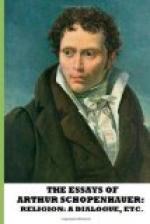Demopheles. Which means, I suppose, that people have arrived at a conviction which they won’t give up in order to embrace yours instead.
Philalethes. Ah! if it were only a conviction based on insight. Then one could bring arguments to bear, and the battle would be fought with equal weapons. But religions admittedly appeal, not to conviction as the result of argument, but to belief as demanded by revelation. And as the capacity for believing is strongest in childhood, special care is taken to make sure of this tender age. This has much more to do with the doctrines of belief taking root than threats and reports of miracles. If, in early childhood, certain fundamental views and doctrines are paraded with unusual solemnity, and an air of the greatest earnestness never before visible in anything else; if, at the same time, the possibility of a doubt about them be completely passed over, or touched upon only to indicate that doubt is the first step to eternal perdition, the resulting impression will be so deep that, as a rule, that is, in almost every case, doubt about them will be almost as impossible as doubt about one’s own existence. Hardly one in ten thousand will have the strength of mind to ask himself seriously and earnestly—is that true? To call such as can do it strong minds, esprits forts, is a description more apt than is generally supposed. But for the ordinary mind there is nothing so absurd or revolting but what, if inculcated in that way, the strongest belief in it will strike root. If, for example, the killing of a heretic or infidel were essential to the future salvation of his soul, almost every one would make it the chief event of his life, and in dying would draw consolation and strength from the remembrance that he had succeeded. As a matter of fact, almost every Spaniard in days gone by used to look upon an auto da fe as the most pious of all acts and one most agreeable to God. A parallel to this may be found in the way in which the Thugs (a religious sect in India, suppressed a short time ago by the English, who executed numbers of them) express their sense of religion and their veneration for the goddess Kali; they take every opportunity of murdering their friends and traveling companions, with the object of getting possession of their goods, and in the serious conviction that they are thereby doing a praiseworthy action, conducive to their eternal welfare. [Footnote: Cf. Illustrations of the history and practice of the Thugs, London, 1837;




